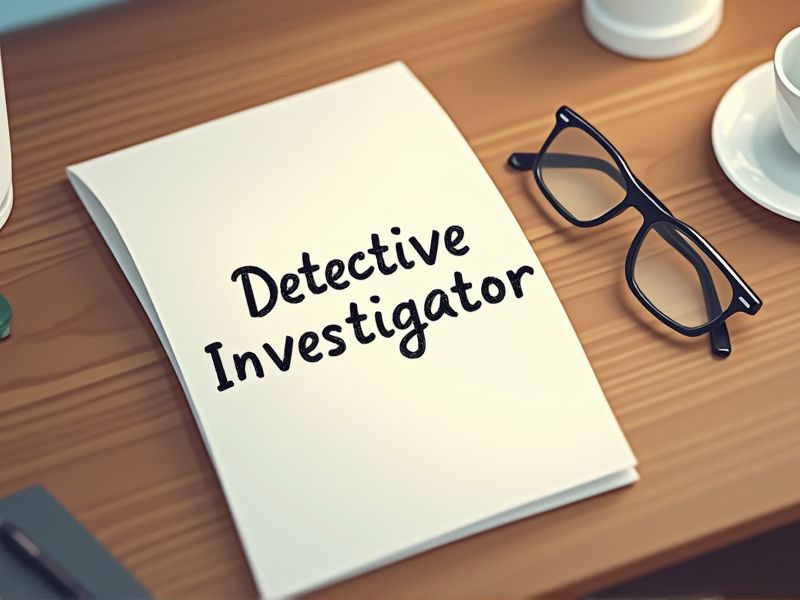
Becoming a Detective Investigator requires specialized skills and knowledge to effectively gather evidence and solve cases. Certifications enhance an investigator's credibility and demonstrate proficiency in various aspects of investigative work. They ensure that detectives adhere to legal standards, leading to more accurate and ethically sound investigations. Key certifications that may be necessary for a Detective Investigator include the following.
Certified Criminal Investigator (CCI)
Becoming a Certified Criminal Investigator (CCI) equips detectives with specialized skills and knowledge essential for conducting thorough and effective investigations. This certification signifies a high level of expertise, which enhances credibility and trustworthiness, especially in complex cases. Training associated with CCI covers advanced investigative techniques, improving the accuracy and efficiency of gathering and analyzing evidence. Legal and ethical guidelines included in CCI training ensure that investigators adhere to lawful practices, reducing the risk of procedural errors.
Certified Fraud Examiner (CFE)
A Certified Fraud Examiner (CFE) possesses specialized knowledge in fraud prevention, detection, and investigation, enhancing the effectiveness of a detective investigator in financial crime cases. The CFE credential signifies proficiency in understanding complex financial schemes, making the investigator better equipped to uncover fraudulent activities. By holding a CFE designation, a detective investigator increases their credibility and trustworthiness when presenting findings in legal settings. The comprehensive training that CFEs undergo enables them to identify red flags and implement strategies that mitigate risks, strengthening overall investigative outcomes.
Certified Digital Forensics Examiner (CDFE)
Detective investigators encounter an increasing amount of digital evidence, needing a Certified Digital Forensics Examiner (CDFE) to expertly analyze and interpret digital data. The CDFE provides specialized knowledge in identifying, recovering, and preserving electronic evidence that might be crucial in solving crimes. Relying on a CDFE ensures that digital investigations are thorough and follow legal standards, thus maintaining the integrity of evidence. Without CDFE certification, gaps in digital understanding could lead to critical oversights or inadmissible evidence in court.
Certified Forensic Interviewer (CFI)
Detective investigators often encounter complex cases requiring specialized skills in extracting accurate information. The Certified Forensic Interviewer (CFI) credential equips professionals with advanced interviewing techniques, enhancing their ability to obtain truthful, reliable statements. CFI training emphasizes behavioral analysis, which helps in identifying deception during interrogations. Possession of a CFI credential often leads to higher success rates in case resolutions due to improved interview efficacy.
Advanced Interviewing & Interrogation Techniques Certification
Detective investigators encounter complex cases that require enhanced skills in understanding verbal and non-verbal cues, which the Advanced Interviewing & Interrogation Techniques Certification can provide. This certification equips them with strategies to discern truth from deception, increasing the probability of resolving cases accurately. The training focuses on psychological approaches, improving an investigator's ability to handle suspects and witnesses effectively. As crime dynamics evolve, such specialized certification ensures detectives remain adept at interrogating in diverse scenarios.
Crime Scene Investigation (CSI) Certification
CSI certification equips detective investigators with specialized knowledge in evidence collection, increasing the accuracy of crime scene reconstruction. This certification ensures adherence to standardized legal procedures, reducing the risk of evidence being dismissed in court. It enhances analytical skills, allowing detectives to interpret forensic data effectively, leading to more accurate conclusions. The credential demonstrates a commitment to professional development, making detectives more credible and reliable in their field.
Evidence Collection & Preservation Certification
Evidence Collection & Preservation Certification ensures that detective investigators adhere to standardized procedures, reducing the risk of evidence contamination or loss. This certification equips investigators with the skills needed to properly document and store evidence, enhancing the credibility of the case. Proper training underscores the importance of maintaining the chain of custody, which is crucial for evidence admissibility in court. The certification helps maintain public trust in investigative work by demonstrating a commitment to accuracy and procedural integrity.
Cyber Crime Investigation Certification
Cyber crime continues to grow more complex, making specialized knowledge critical for detective investigators to effectively address digital threats. Certification equips professionals with the latest tools and methodologies needed to uncover and combat cyber criminal activities. Having a cyber crime investigation certification enhances credibility and demonstrates a commitment to staying updated in a rapidly evolving field. Certified investigators are better prepared to ensure the integrity of digital evidence, which is crucial for successful legal proceedings.
Intelligence Analysis Certification
An Intelligence Analysis Certification equips a Detective Investigator with advanced skills in data interpretation, enhancing their ability to anticipate criminal patterns. Certification provides standardized methodologies crucial for maintaining accurate and efficient investigative processes. With the rising complexity of criminal activities, certified intelligence analysis empowers investigators to stay ahead of emerging threats. The certification fosters improved decision-making, ensuring law enforcement strategies are both proactive and evidence-based.
Law Enforcement Leadership Certification
Law Enforcement Leadership Certification enhances a detective investigator's ability to manage complex cases and lead teams effectively. It provides structured training on critical decision-making, risk management, and ethical standards, which are crucial in high-stakes investigations. Certification often leads to improved communication skills, fostering better collaboration with other agencies and community stakeholders. The credential also signals a commitment to professionalism and continuous development, potentially opening doors for career advancement and specialized roles.
Summary
When you obtain certifications as a detective investigator, your credibility and professional knowledge significantly enhance. This leads to increased trust from both colleagues and the public. Such credentials can directly impact career advancement opportunities. Higher professional standing often translates into more complex and rewarding cases.
